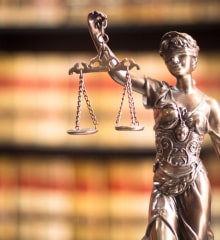Wiping Out Lawsuit Judgments with Bankruptcy
The only thing worse than having a debt in collections may be having a debt that’s become a judgment.
A judgment is a court decision that allows a creditor or debt collector to take legal steps to collect payment from a delinquent debtor. This can
include freezing your bank account, garnishing your wages, and even repossessing your assets. Additionally, the judgment holder can charge a court-approved
interest rate on the debt until you pay up.
But perhaps the worst part of a judgment is that, as a matter of public record, it goes on your credit report – where it can wreak havoc on an already-low
credit score and prevent you from qualifying for new lines of credit.
When your creditor gets a judgment against you, it can feel as if you’ve hit rock bottom. The good news is that, once you’re there, you’ve got nowhere to go but up.
Judgments don’t have to be the end of the road for debtors. In fact, in many cases, it’s possible to have a judgment removed for good.
While you can’t pay to remove a judgment, you may be able to challenge it. Courts and data brokers often fail to keep adequate records. Since any kind of
mistake or inconsistency on your record can result in the judgment being nullified, simply writing a letter to the court asking them to substantiate a
judgment may be enough to have it removed. The sooner you contest a judgment, the better your chances of having it withdrawn.
But what if the court kept good records – and the data contained in the judgment is accurate? If the debt is considered dischargeable, you may still be
able to remove the judgment – and accompanying debt – by filing for personal bankruptcy.
From the moment you file bankruptcy, a
legal action known as the automatic stay stops creditors from trying to collect on debts. Meanwhile, unsecured debts such as credit card debt and medical bills can be
wiped out completely with Chapter 7, along with any judgments. Chapter 13 bankruptcy can also eliminate judgments, though you’ll need to enter a repayment plan to pay
off your debts. At the end of the three to five year repayment period, remaining debts will be discharged.
One thing to note: If you own a home, having a judgment against you can mean a lien has been attached to your property. However, filing a separate motion with the
bankruptcy court may be able to remove the lien as well.
Lawsuits and judgments for unpaid debts are notoriously complex. The solution, however, can be easy. By filing for bankruptcy, many debtors are able to remove
judgments while also eliminating debt and protecting against collection activities.
With the right bankruptcy plan - along with a commitment to staying out of debt post-bankruptcy – you can literally erase your worries with your debt for a fresh financial start.
To learn more about bankruptcy and whether it’s right for your financial situation, contact DebtStoppers today to
schedule your complimentary personal debt consultation with one of our experienced bankruptcy attorneys.
Resources:
How to Get a Judgment Off Your Credit Report, by Nicholas Pell, MainStreet.com


